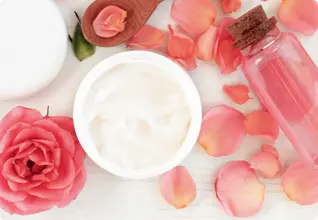Moisturisers Explained

We all know that moisturising our skin is important, but do we know why? Not only does regular moisturising keep your skin hydrated, but when you apply a moisturiser it also provides a physical barrier for environmental irritants, helping to lock in serums and treatments, reducing the risk of premature skin ageing.
We’ve asked one of our consultant dermatologists, Dr Jinah Yoo, to explain what moisturisers are, why they’re so important and what ingredients to look out for based on your skin type.
First things first, we need to understand the structure of our skin…
Skin is the largest organ in our body. The top layer of the skin, called stratum corneum, is made up of skin cells (keratinocytes) and lipids.
Try to imagine these skin cells as ‘bricks’ and the lipids as ‘mortar’ holding bricks together. This creates a waxy coating or protective barrier which helps to prevent water loss through the skin as well as protects against the environment – such as UV, injuries and infections.
So, why does our skin become dry?
Humans lose about 300 to 400 ml of water through the skin every day. This water loss into the atmosphere increases when the skin’s protective barrier is damaged or impaired, making skin become dehydrated.
Whereas dehydrated skin is caused by the lack of water, dry skin is due to the lack of lipids (sebum) in this top layer of the skin. That said, dehydrated skin can appear as dry skin, as well as causing other skin issues such as sunken eyes and a dull skin tone.
How can moisturiser help dry skin?
Moisturiser helps to restore the skin barrier to prevent the water loss from our skin. This is via occlusives such as petrolatum, lanolin or mineral oils, or by attracting moisture from surrounding humid environment with ingredients such as glycerin, urea and hyaluronic acid. Ceramides, which are natural lipids present in our skin, are also available as an ingredient in some moisturisers to help replenish the lipids in dry skin.
What’s the difference between day moisturisers versus night moisturisers?
The main differences between day and night moisturisers are the additional ingredients each contain. During the daytime, our skin is exposed to UV and pollutants which are well-known factors contributing to skin cancer or skin ageing. Extra properties are often added to day moisturisers such as UVA/UVB filters and antioxidants.
These additional ingredients help to protect against damage from the sun exposure and pollutants. Also, day moisturisers are lighter than night moisturisers which make it easier to apply before make-up.
In general, night moisturisers are thicker and greasier. It has been shown in research studies that skin cells have their own clock (Circadian rhythm) and repair of skin cells from damage caused by UV during the day peaks at night. The skin also becomes leakier at night leading to increased water loss through the skin. Considering these mechanisms, you can achieve extra benefits from a night moisturiser containing large concentration of anti-ageing ingredients such as retinol or peptides.
What should I look out for based on my skin type?
Firstly, the consistency of the moisturiser is important – thicker ointments are good for dry itchy skin, creams work well for normal skin and lotions for oily skin, but it is important to tailor your moisturiser to your skin type:
Sensitive skin: choose a fragrance-free and hypoallergenic moisturiser to reduce the irritation. Moisturisers containing niacinamide (Vitamin B3) or natural ingredient such as aloe vera can help to soothe sensitive skin. I recommend the Avène Skin Recovery Cream, which is a calming cream for skin that is fair, thin or prone to redness or skin that has become sensitised.
Acne-prone skin: use an oil-free, non-comedogenic lightweight moisturiser. This will reduce the risk of pores being blocked. Those containing alpha-hydroxy acids or niacinamide can also help with acne-prone skin. I recommend the sk:n Hydrator for Oily/Blemish Prone Skin for both day and night time as it provides 24-hour hydration and protection without causing congestion and has anti-inflammatory properties to soothe the skin and help reduce redness.
Dehydrated skin: it is important to replenish any lost water to dehydrated skin. Ingredients such as glycerin and hyaluronic acid can help to attract water to the skin from the surrounding environment. I recommend the Avène Hydrance Optimale Rich which is a rich hydrating moisturiser suitable for dehydrated or dry skin.
Combination skin: Use a lightweight moisturiser but apply additional amount of the same moisturiser or even a different thicker moisturiser to dry part of your skin. Avène Hydrance Optimale Light is a light moisturiser which is suitable for most skin types and you can reapply another thicker layer for dry parts of your skin.
Doctor Jinah Yoo is a Consultant Dermatologist at sk:n. Find out more about Jinah and her work here.
Related Articles

08
Apr 2024

08
Apr 2024
Request a callback
One of our friendly sk:n advisors will call you to book your consultation.
- More than 450 consultants, doctors, nurses and medical practitioners
- Regulated by the Care Quality Commission, Health Inspectorate Wales and Health Improvement Scotland
- Partner of the NHS
- Rated excellent by our clients on Trustpilot
- Strict safety and care protocols




